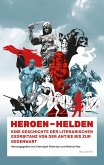Distinguishing the graphic novel from other types of comic books has presented problems due to the fuzziness of category boundaries. Against the backdrop of prototype theory, the author establishes the graphic novel as a genre whose core feature is complexity, which again is defined by seven gradable subcategories: 1) multilayered plot and narration, 2) multireferential use of color, 3) complex text-image relation, 4) meaning-enhancing panel design and layout, 5) structural performativity, 6) references to texts/media, and 7) self-referential and metafictional devices. Regarding the subcategory of narration, the existence of a narrator as known from classical narratology can no longer be assumed. In addition, conventional focalization cannot account for two crucial parameters of the comics image: what is shown (point of view, including mise en scène) and what is seen (character perception). On the basis of François Jost's concepts of ocularization and focalization, this book presents an analytical framework for graphic novels beyond conventional narratology and finally discusses aspects of subjectivity, a focal paradigm in the latest research. It is intended for advanced students of literature, scholars, and comics experts.
Bitte wählen Sie Ihr Anliegen aus.
Rechnungen
Retourenschein anfordern
Bestellstatus
Storno








